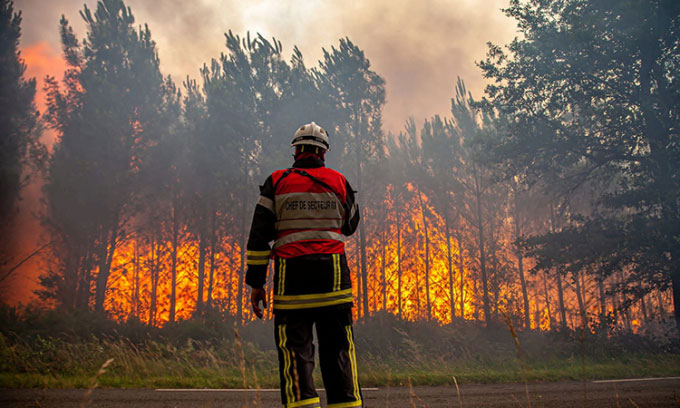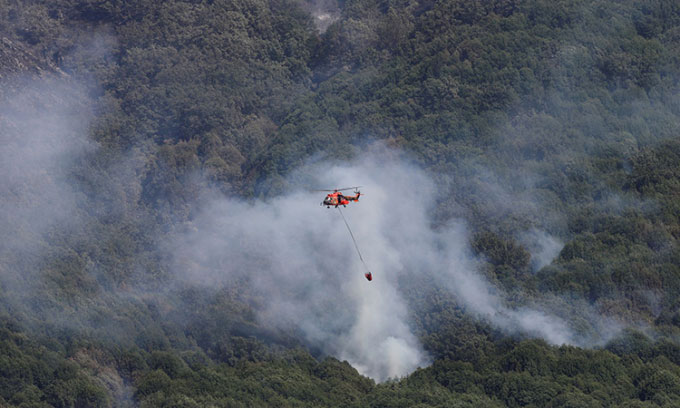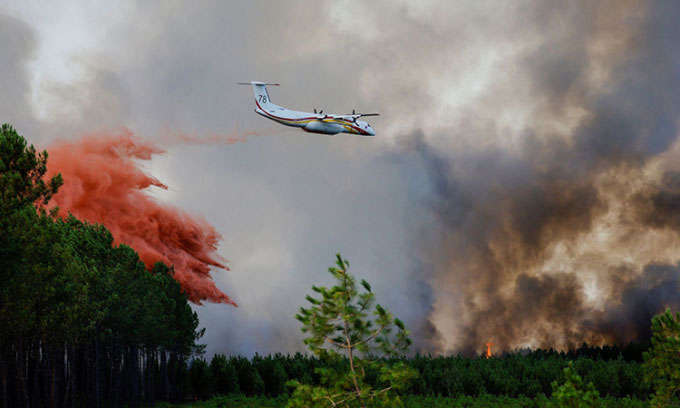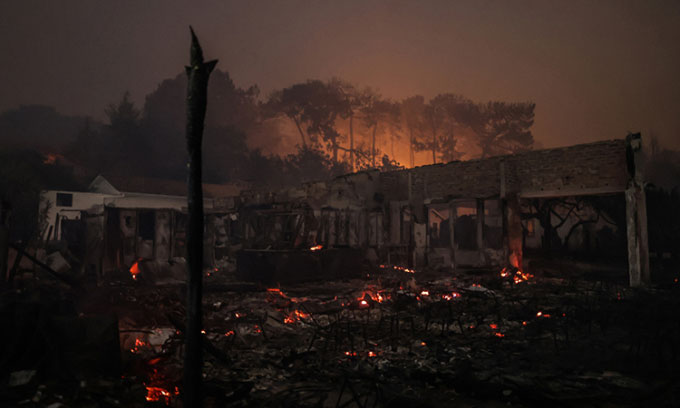Experts believe that climate change is causing heatwaves to occur more frequently, last longer, and become more intense, leading to widespread wildfires.
Heatwaves and Wildfires Ravage Europe

Firefighters tackling a blaze near Landiras, Gironde, southwestern France, on July 15. (Photo: Reuters/SDIS 33)
France is experiencing its second major heatwave since the beginning of summer, with most provinces under a level 2-3 warning, where temperatures in some southwestern areas could reach up to 40 degrees Celsius and are expected to last for several days.
“We are experiencing an extremely harsh season. The amount of forest burned is three times greater than in 2020,” French President Emmanuel Macron stated on July 15.
Residents and tourists in many areas of France, Spain, and Portugal are being evacuated due to wildfires, BBC reported on July 17. The fires are driven by a strong heatwave, with some blazes lasting for weeks.
In France, over 12,000 people have been evacuated from the Gironde region in recent days, as more than 1,000 firefighters work to control the wildfires, according to the authorities in Nouvelle-Aquitaine and Gironde. The French meteorological agency predicts new temperature records may be set on July 18.

Helicopter combating a fire in the Garganta de los Infiernos nature reserve, Spain, on July 17. (Photo: Reuters/Isabel Infantes)
Since July 12, temperatures in Portugal have reached as high as 47 degrees Celsius and above 40 degrees Celsius in Spain, making rural areas dry and flammable. Approximately 2,300 people have been evacuated from southern Spain due to the expanding wildfires.
Portugal is also suffering from wildfires. Five areas in the central and northern regions were placed on red alert on July 15, as over 2,000 firefighters tackled four major fires. Wildfires in Portugal have destroyed 30,000 hectares of land this year—the largest area since the summer of 2017.
Other European countries, including Italy and Greece, are also facing wildfires. In Greece, civil protection agencies are working to extinguish flames raging on the island of Crete in the Mediterranean.

Firefighting aircraft dropping fire retardant to extinguish flames in Guillos amid widespread wildfires in the Gironde region, southwestern France, on July 16. (Photo: Reuters/Sarah Meyssonnier)
What is Causing Wildfires to Sweep Across Europe?
Experts are unclear about exactly how the wildfires start. However, most fires are often ignited by human activities such as campfires or barbecues, according to BBC. Fires spread more quickly and further in hot, dry weather.
Heatwaves are becoming more frequent, intense, and prolonged due to climate change—a phenomenon caused by human activities. Climate change increases the risk of hot, dry weather, creating favorable conditions for wildfires.
Heatwaves in Europe have increased in both frequency and intensity over the past four decades. According to a study published in the journal Nature Communications in early July, changes in Europe are occurring faster than in other regions of the world, including hotspots like the western United States.
The current heatwave in Europe is formed by the jet stream (a narrow, fast-moving air current in the atmosphere) shifting northward, according to Ben Rich, a weather forecasting expert at BBC. A part of the jet stream splits off, creating a low-pressure area to the west of Portugal, acting like a pump, pushing heat northward into Western Europe, including Spain, France, and the UK.
“Climate change is driving this heatwave, just as it drives all current heatwaves. Greenhouse gases from burning fossil fuels like coal, gas, and oil are making heatwaves hotter, longer, and more frequent,” Friederike Otto, a senior lecturer in climate science at the Grantham Institute at Imperial College London, explained to The Guardian.

A restaurant burned down near La Teste-de-Buch, southwestern France on July 15. (Photo: Thibaud Moritz/AFP)
Warnings from Experts
Heatwaves put people at risk of heatstroke, heat exhaustion, and drowning while trying to cool off. Pets and farm animals are also vulnerable. “Even healthy individuals can be adversely affected. However, the most vulnerable groups are young children, the elderly, and those with pre-existing health conditions,” said Dr. Eunice Lo, a climate scientist at the University of Bristol.
Extreme heat can also damage infrastructure, such as melting road materials and causing railway tracks to warp. “The longer a heatwave lasts, the greater the impact on wildfires and public health,” Rubén del Campo, a spokesperson for the Spanish meteorological agency, told The New York Times.
The world has warmed by approximately 1.1 degrees Celsius since the start of the industrial era, and temperatures will continue to rise if countries do not significantly reduce carbon emissions. Rising temperatures are a sign of climate change, and in the UK, an additional 2,000 people die each year due to heatwaves, according to Lo.
The ten hottest years in the UK since 1884 have all occurred since 2002. “Globally, heatwaves are becoming more common and longer-lasting. We need to stop burning fossil fuels; we must act now and act quickly,” Lo warned.


















































